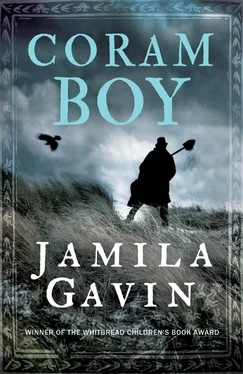It was dark now. The rain still beat down on the canvas covering and, for a while, they were mesmerised by the rhythmic swish and sway of the wagon and the hollow slurpy plod of the animals’ hooves. There was a stir of surprise and a quiver of anxiety among the children when the creaking of the wheels stopped and they came to a halt. Apart from the sound of the rain and the snorting of mules, blowing away the rain from their nostrils, there was no other sound.
They were not yet within earshot of the city. Meshak sat up, his arms still clasped round Jester. The brats’ eyes gleamed in the darkness. They seemed not to have moved a muscle since he had climbed inside to get out of the rain half an hour ago. He heard Otis jump down. The light of his lantern swung a yellow shaft across the canvas. Then the flap opened and his dark drenched face looked in. Rain was spangled through his thick, straggly hair, reflecting in the light like so many diamonds. He nodded curtly to Meshak. ‘Get the spade. There’s a good ditch just here. We’ll dig them in,’ he jerked his head in the direction of the panniers strapped to the train of mules. ‘I don’t want to take them into Gloucester.’ Meshak jumped out and had to tie the flap to keep Jester in, so he then set up a continuous barking. Meshak knew from many, many times before that they couldn’t have Jester digging anything up.
It was a hurried affair in all that wind and rain and darkness and the swinging light from the storm lantern, which Otis hung on a branch directly over the ditch. Otis plunged in his spade. Nothing too deep or careful. There was a lot of water. Just dig a hole deep enough to submerge the bundles. Foxes would do the rest. He wouldn’t have bothered burying them had he not taken money for them and given undertakings. Otis dug and Meshak went from mule to mule, extricating one bundle after another from the panniers to hand to his father, who dropped them like seeds into the ditch. Meshak stared wonderingly as they sank into the mud and vanished even before his father had shovelled a few spadefuls of earth over them. What was it like to be dead? Meshak tried to imagine. What did they see under the mud? Would they find angels there; angels like the ones he saw in church windows?
They came to the last one – the one the lady had given them on the other side. Meshak hesitated. ‘Come on, lad – drop it in!’ rasped Otis.
‘Moving. Still alive,’ stammered Meshak. Usually, if they weren’t dead, they at least tried to sell them off first.
‘Not worth it. Drop it in, I say.’
Meshak let go the feebly moving bundle. He heard it splosh into the ditch. He backed away whimpering. He never did like burying the live ones. He felt the apple he had just eaten rise with the bile up his gullet. He vomited against a tree, leaning his head into the bark so that it left its imprint on his brow.
‘Don’t go lily-livered on me,’ snarled Otis, grabbing his coat and herding his son back to the wagon. Jester was still barking. ‘Go on, get in. Mrs Peebles is expecting us tonight at the Black Dog.’ Jester stopped barking.
Meshak didn’t need eyes to know they had entered Gloucester. Despite the constant thud of rain on to the canvas covering, he heard the swell of sound. It came towards them like a distant wave and then crashed over them; an overwhelming cacophony of babble, all the stuff of humans and their animals and their livelihoods. He had been dozing, lying with his face still partly buried in Jester’s fur, relishing the sounds of the city while not yet ready to face it. He didn’t even open the flap when he heard the wagon and the mules’ hooves clattering over cobblestones; nor when he smelt the stench of open sewers and foraging pigs, and the manure of horses and mules, and wet straw intermingled with women’s perfume and polished leather and charcoal fires and grilled fish. He knew without looking, by the heavy smell of beer and the raucous sounds of fiddling and singing, that they had entered the courtyard of the Black Dog inn.
No good getting too excited yet. There were jobs to be done: the wagon unhitched, the mules unloaded, water pumped, hay gathered, stable space negotiated . . .
‘I want to piss,’ whimpered a child.
Oh yes, and the brats seen to. He would have to rope them all together so they wouldn’t run away, and lead them out of the far gate to relieve themselves in all that rain and mud, and then go to the kitchen and get them some gruel. It reminded him of how hungry he was.
It was still raining. Girls in bonnets and shawls slopped across the yard to and from the kitchen, fetching and carrying water for the cook, or chickens for the slaughter, and buckets of swill and scrapings for the animals. Young lads, eager to make a few pennies, rushed forward to grab the bridles and lead the mules to the barns, clamouring to offer their services. Otis selected three of them, yelled out orders, and then made for the door of the inn. ‘See to things. I’ll be inside,’ he yelled, leaving Meshak squelching about in the yard, ankle-deep in mud and manure.
Meshak ‘saw to things’ as he always did, but began to feel his stomach tightening with hunger, especially with a smell of roast beef coming from the kitchen. He was almost tempted to eat the gruel dolloped out from the kitchen for the brats, though just looking at it made him want to puke. He was sure even the pigs wouldn’t eat it. But the brats fell upon it. He took the wagon and children into a barn to stay for the night. As he closed the huge wooden doors, one of the brats called out plaintively, ‘Can’t we have a light, mister?’ Meshak didn’t bother to answer and, pulling the doors to, dropped the great latch and locked them into the pitch, rat-scuttling darkness.
He went to look for Otis and pushed his way into the dark inn with Jester at his heels. The atmosphere was choking with smoke and stuffiness. In a corner by the roaring fire, red-faced musicians and sailors, entwined with young women, jigged and sang, glad to be on dry land after months at sea. Others played cards and, in a further room, serious gambling was going on.
Meshak squinted through the haze and at last discovered his father deep in conversation with a naval man. These days, Otis made more from selling boys on to the ships than anything else. They would sell the three older boys he had just brought in.
Meshak managed to squeeze himself on to the bench next to Otis, who grabbed a passing barmaid. ‘Hey, darling!’ He pulled her down on his knee, causing ale to splash out of the four tankards she was carrying, two in each hand.
‘Now look what you’ve made me do,’ she giggled. As it was Otis, she wasn’t cross. ‘Good to see you, Otis,’ she purred.
He burrowed into her neck and then murmured, ‘Is Mrs Peebles in her parlour?’
The barmaid tut-tutted with exaggerated disappointment and wriggled off his knee. ‘Why is it you always fancy her more than me?’ she pouted.
‘ ’Cos she’s prettier!’ He slapped her bottom and they both laughed.
‘She’s back there. Shall I tell her you’re here?’
‘Do that, my sweet, and while you’re about it bring me and the boy some ale and meat.’
‘Hello, Meshak,’ she purred, tweaking his chin before weaving her way through the crowd and disappearing into the kitchen.
It was an hour later, after Meshak and Otis had drunk several pints of ale and consumed a full plate of meat and potatoes and dumplings, when the barmaid came and said Mrs Peebles could see him. Otis got to his feet and, like shadows, Meshak and Jester followed him through the dense crowd and out of a far door which led into a dark narrow passageway at the back. It was instantly chillier and Meshak shivered. He knew Mrs Peebles’ parlour. Whenever they passed through Gloucester, Otis always called in.
Читать дальше












